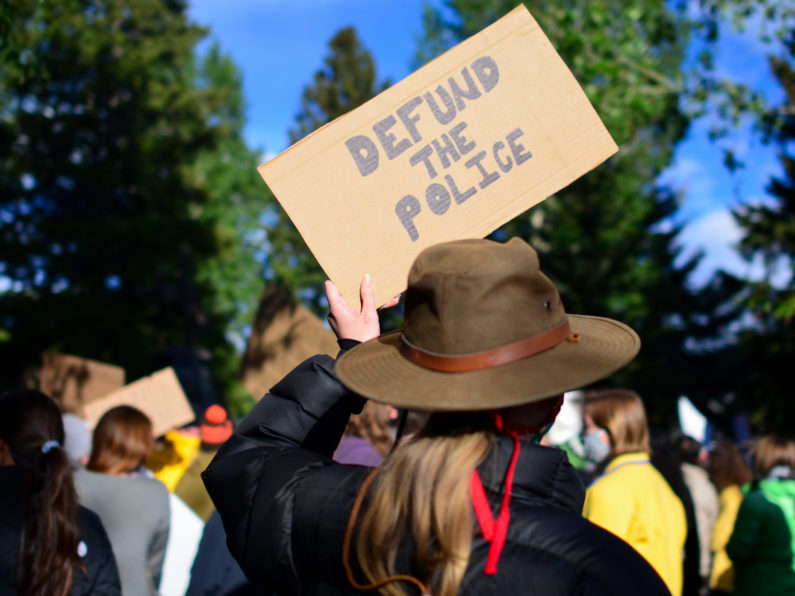At a June 8 Black Lives Matter rally, Joe Scorza’s sign stood out. Instead of directly addressing racism, it showed numbers. Big numbers.
“Teton County 2020 Budget: Police/Public Safety $8,236,105; Affordable Housing $1,545,057; Public Health $2,058,753.”
Scorza said police presence is “overstated” here. He wanted to highlight that Teton County spends more than twice as much on public safety (patrol, search and rescue, the jail, dispatch, court security and administration) as it does on public health and affordable housing combined. Jackson, meanwhile, spent $5 million on its police department last year, growing that figure to nearly $13 million spent on valley law enforcement.
By comparison, Blaine County, Idaho, which closely resembles Teton County in demographics and population, spends roughly $4 million less on its law enforcement. In 2020, Blaine County spent about $3.7 million on its sheriff’s department, $1.5 million on Ketchum city police, and close to $3.4 million on detention. The total law enforcement budget was $8,636,213. Blaine County’s cost of living, however, must also be noted. According to Zillow, the median home price there is $578,068 versus Teton County’s $939,031. Salaries in Jackson could be higher to keep officers living in the community they serve.
Defining “Defunding”
Amid national calls to “defund” the police, some residents are calling for a redistribution of policing funding.
A newly formed organization called Act Now JH wants to change the way Jackson and Teton County approach law enforcement. According to their website, they are “a grassroots movement invested in upholding Teton County’s status as a role model community: one in which we collectively invest in supportive services and divest from punitive institutions.” They seek to redirect funds from policing to social service agencies, and have issued a petition for residents to sign.
“We want to revamp how we look at justice,” Act Now JH member Ivan Jimenez said.
The nationwide movement to defund law enforcement agencies has gained traction in the wake of the Minneapolis police killing of George Floyd on May 25. The movement seeks to address systemic racism within law enforcement and argues that funding could be better spent on alleviating poverty, providing affordable housing, ensuring mental health care and substance abuse treatment, and other social issues. The idea is that by reimagining public safety issues and addressing the root causes of violent crime, like poverty, America could ensure the peace its peace officers have been tasked with enforcing.
Jackson Police Chief Todd Smith spoke at a town council meeting Monday when the council was set to approve the town’s 2021 budget. Smith said the video of Minneapolis police officer Derek Chauvin kneeling on Floyd’s neck for nearly nine minutes does not represent what policing is about.
To illustrate his officers’ skills at de-escalation, Smith showed a video of an incident in Jackson when police were called to respond to a suicidal individual holding a knife to his own throat on a city sidewalk. The officers were able to calm the man and take him safely to the hospital. Smith said that in another city this incident could have resulted in deadly force.
“I suspect that law enforcement is always going to be that agency going to these kinds of calls until we figure out a better way to do it,” Smith said. “I think we are following the best practices that we can.”
Smith said he and his officers are dedicated to serving their community and they now feel that they are being painted as Derek Chauvins. “Judge us by our individual merits,” he said in a written statement to the council, also stating that he and his officers wake up every day hoping for a day “free of violence and chaos.”
“I suspect that law enforcement is always going to be that agency going to these kinds of calls until we figure out a better way to do it. I think we are following the best practices that we can.”
Jimenez pushes back against the narrative that the intent of the defund movement is a personal attack on individual police officers. He said Act Now JH wants to shed light on the bigger systemic injustices they say were built into American policing from the beginning. “It’s not designed to serve the people,” Jimenez said. “It’s designed essentially to protect private property and the interests of the wealthy.”
The ideological debate over policing was not solved in Monday’s town budget meeting, and the 2021 fiscal year budget was passed without further cuts to the police department. The department’s funding had already been cut by roughly 16 percent due to impacts from the COVID-19 pandemic.
The bulk of law enforcement agencies’ budgets go to salaries and other employee costs like health insurance and pensions. A rough estimate of 2020 sheriff’s department salaries, Medicare expenses, health insurance, retirement, and workers’ comp adds up to $3,573,093.
Teton County Sheriff Matt Carr says he is working with a bare-bones staff. His goal is to have enough staff to answer calls for service 24 hours a day, seven days a week. “We haven’t added staff to our patrol division in quite some time,” Carr said. “We don’t have any built-in cushioning or redundancy there.”
Carr said that for graveyard shifts, he often only has one deputy on duty for the entire county – which stretches from Hoback Junction to Moose. “The idea is to have at least two on duty so they can respond to two-person calls,” Carr said. Daytime staffing is equally tight, he said, with an average of only four deputies on duty, even during busy summer months. “We are way behind on where we could be,” Carr said.
Sheriff’s office communications manager Riclyn Betsinger says county residents are used to calling the cops for far more than just burglaries or violent threats. “The community has been conditioned to call law enforcement for things that don’t need law enforcement,” she said.
In 2019, only about 700 of the 44,000 calls for service to law enforcement had to do with something potentially criminal. Calls for service do not mean that actual criminal activity was discovered or prosecuted as such.
Inger Hanson, pastor of Shepherd of the Mountains Church, would like local officials to examine the size of the local force and consider alternative approaches to community safety. She attended the June 4 brown bag lunch discussion on local law enforcement, where she pressed for policies to reduce police harm.
“Do we need as many police officers in the off seasons?” Hanson said in an interview with KHOL. “Could funds be spent on a different kind of public servant, who assisted police in busy times, but focused on other areas that strengthen our community, such as suicide prevention or mental health?”
From her perch in the dispatch department, Betsinger has a bird’s eye view of all calls for law enforcement that come in. She thinks it would be a rude awakening for the community if defunding law enforcement led to an absence of cops. “That would be an interesting experiment,” she said. “When we don’t have anyone to send when someone is breaking into your house.”
As it happens, residential burglaries are rare in Jackson. According to a summary of 2019 calls for service, 12 calls came in for house burglaries. What is less rare is domestic violence. Dispatch received 48 domestic violence calls in 2019. Though several local law enforcement and elected officials have said this is an important area of police service, not all people agree.
“Do we need as many police officers in the off seasons? Could funds be spent on a different kind of public servant, who assisted police in busy times, but focused on other areas that strengthen our community, such as suicide prevention or mental health?”
Act Now JH member Rachel Attias spoke at a county commission meeting Monday about her experience surviving domestic violence by her father, a police officer in the Bronx, New York. “Police can and do commit domestic violence,” she said. Attias feels that law enforcement is ill-suited to provide support to victims and that more funding is needed for preventative agencies like the Community Safety Network.
Police, she said, are reactionary not preventative, and not trained to provide the emotional and mental health support a victim needs. “The help you receive from police can often be more traumatizing because it thrusts you into the context of law enforcement.”

Ivan Jimenez, of the newly formed group Act Now JH, at a recent Black Lives Matter rally. He says he wants to see some of the money earmarked for police redirected to preventative social services. (Robyn Vincent/KHOL)
As Jackson reckons with questions of what it wants law enforcement to do, and how crime rates relate to staffing needs, elected officials have signaled a willingness to dig deeper as well.
Teton County Commissioner Natalia Macker says it’s all about finding the right staffing balance. One concern specific to tourist towns like Jackson is the fluctuating numbers of people in the area at any given time. Macker said budgeting is always a push-pull between the money the community has to meet its essential needs versus budgetary needs at the height of the tourist season.
“You don’t staff for your worst day, but you have to be prepared,” Macker said. “The way it looks on November 5 is very different than the way it looks on July 5.”
Macker welcomes public input on budgeting, a sentiment echoed by Mayor Pete Muldoon.
“We have budget meetings every year and no one ever attends them,” Muldoon said at the council meeting Monday. “I find this engagement on this issue very refreshing and very gratifying.”
Muldoon went on to say that society should critique police departments with bad cultures, but he didn’t think Jackson’s was one of them. He also said the conversation about systemic racism needs to extend beyond law enforcement to all facets of society.
Jacskon does not have a history of police brutality. In his 29 years in law enforcement, Chief Smith says police here have never shot a citizen. He pointed to just two times in the last eight years that police have deployed a taser.
Statewide, it is a different story, however.
Albany County for Proper Policing executive director Karlee Provenza said people shouldn’t assume Wyoming cops don’t shoot citizens. According to MappingPoliceViolence.org, Wyoming has the 12th highest rate of police killings per capita in the nation. The rate, however, is not higher for people of color.
A scholar focused on the psychology of the American legal system, Provenza never thought a police killing would happen in her city, until it did. In 2018 Albany county sheriff’s deputy shot and killed Laramie resident Robbie Ramirez during a traffic stop.
“I’ve studied this and watched it across the country. And I still thought it wouldn’t happen here,” she said.
Local officials have uniformly expressed an interest in continued community conversation about racism, policing, and how to ensure Jackson is a safe place for everyone. Macker says she is educating herself on issues of police and criminal justice reform. She understands that some people see these systems as beyond repair because of their long histories of enforcing racism. But she doesn’t want to assume that what works for one community will automatically work for Jackson.
The place to start, she says, is listening to the public and making sure all voices are heard.
The question of the hour, Macker said: “What does it look like for government to really listen right now?”
Robyn Vincent contributed reporting.






